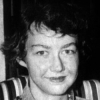Flannery O'Connor

Flannery O'Connor
Mary Flannery O'Connorwas an American writer and essayist. An important voice in American literature, she wrote two novels and 32 short stories, as well as a number of reviews and commentaries. She was a Southern writer who often wrote in a Southern Gothic style and relied heavily on regional settings and grotesque characters. Her writing also reflected her own Roman Catholic faith and frequently examined questions of morality and ethics. Her posthumously-compiled Complete Stories won the 1972 U.S. National Book...
NationalityAmerican
ProfessionNovelist
Date of Birth25 March 1925
CitySavannah, GA
CountryUnited States of America
When she told a story, she rolled her eyes and waved her head and was very dramatic.
There is something in us, as storytellers and as listeners to stories, that demands the redemptive act, that demands that what falls at least be offered the chance to be restored.
When you can state the theme of a story, when you can separate it from the story itself, then you can be sure the story is not a very good one.
I write any sort of rubbish which will cover the main outlines of the story, then I can begin to see it.
A story is a way to say something that can't be said any other way, and it takes every word in the story to say what the meaning is. You tell a story because a statement would be inadequate. When anybody asks what a story is about, the only proper thing is to tell them to read the story. The meaning of fiction is not abstract meaning but experienced meaning.
The meaning of the story is the story.
I have also led you astray by talking of technique as if it were something that could be separated from the rest of the story. Technique can't operate at all, of course, except on believable material.
You ought to be able to discover something from your stories. If you don't, probably nobody else will.
A story has to have muscle as well as meaning, and the meaning has to be in the muscle.
I find that most people know what a story is until they sit down to write one.
In the greatest fiction, the writer's moral sense coincides with his dramatic sense, and I see no way for it to do this unless his moral judgement is part of the very act of seeing, and he is free to use it. I have heard it said that belief in Christian dogma is a hindrance to the writer, but I myself have found nothing further from the truth. Actually, it frees the storyteller to observe. It is not a set of rules which fixes what he sees in the world. It affects his writing primarily by guaranteeing his respect for mystery...
...the only thing that makes the Church endurable is that it is somehow the body of Christ and that on this we are fed. It seems to be a fact that you have to suffer as much from the Church as for it but if you believe in the divinity of Christ, you have to cherish the world at the same time that you struggle to endure it.
The operation of the Church is entirely set up for the sinner; which creates much misunderstanding among the smug.” (August 9, 1955)
Her name was Maude and she drank whisky all day from a fruit jar under the counter.